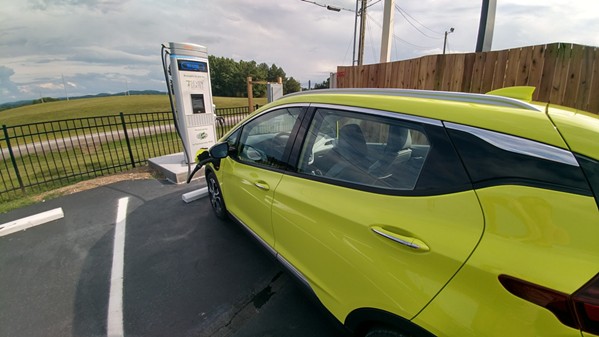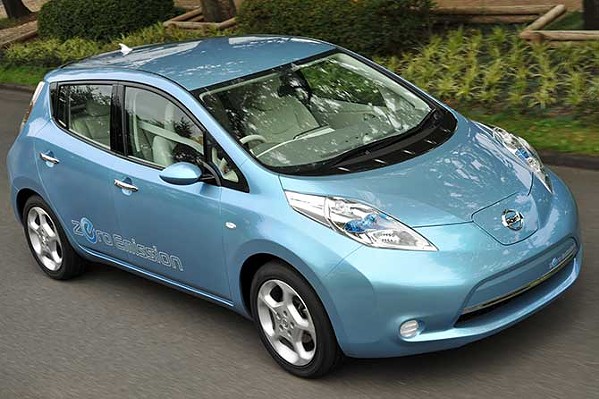Don't be surprised if you start seeing more charging stations in Tennessee.
Only about 13,000 electric vehicles (EVs) drive the road of the Tennessee Valley, according to the Tennessee Valley Authority (TVA). The public power agency made a key move last month hoping to increase that figure, a move that earned TVA applause from an environmental group.
In mid-November, the TVA board approved a new commercial rate structure just for EV charging stations. The vote was intended to support the expansion of EV charging infrastructure across the region, removing a big barrier for consumers to, perhaps, buy more EVs.
That barrier is commonly called “range anxiety." It’s the worry that an EV’s battery will run out before the owner makes their destination or finds another charging station. Now, nearly 80 Tennessee cities have charging stations, according to ChargeHub. Memphis has 113 charging stations and 52 of them (46 percent) offer free charging. Nashville has 325 stations, Knoxville has 107, and Chattanooga has 101, according to the website.
About 320,000 new electric cars were sold in the U.S. in 2019, according to a report from the International Council on Clean Transportation (ICCT), making the country the third-largest EV market in the world. Half of those vehicles were sold in California and 20 percent of those were sold in San Jose, California. Memphis sales accounted for about 0.5 percent of the total. Charging infrastructure remains a barrier but is improving, according to the report.
“With the average compounded annual growth rate at 30 percent across the 50 metropolitan areas, charging infrastructure deployment is in line to meet the expected charging gap through 2025,” reads the ICCT report. “Areas with the highest electric vehicle shares typically had at least 450 public chargers per million population....half of the U.S. population lives where charging is less than half the same benchmark.”
Drew Frye, program manager for TVA’s Electric Vehicles EVolution initiative, said on TVA’s website that other barriers to EV adoption in the valley also include lack of support from state and local governments and local utilities, the availability of electric cars, and consumer awareness about EVs in general.
“TVA is looking at what we should do to minimize or remove each of these barriers,” Frye said. “We’ll start by establishing policies that look at the EV rate as a unique and separate class, and creating a new, economic, stable rate for those building charging stations — something we can do quickly in our role as regulator.”
Carving out a commercial rate for EV charging stations will “allow TVA’s 153 local power companies to easily provide fast charging and the possibility of private companies to resell power at the fast chargers they own and operate. Simply put, this move opens the door to the development of more rapid charging stations across the TVA’s service area. So-called ‘range anxiety’ prevents many consumers from even considering EVs today. So a more robust network is key to providing assurance to consumers that they will have access to fast charging when and where they need it while on the road,” TVA said.
After the vote, the Sierra Club announced its support of TVA’s move on charging stations.
“It’s vital for the electric utility sector to invest in EV programs,” said Jonathan Levenshus, director of federal campaigns at the Sierra Club’s Beyond Coal Campaign. “So, TVA’s commitment is an important first step to moving EVs into the fast lane of adoption, especially in a region that’s quickly becoming an important electric vehicle manufacturing hub.”
General Motors, for example, announced in October it would invest nearly $2 billion in Tennessee to build a new line of luxury SUVs at its Spring Hill plant.
“Electrifying transportation is a key strategy for many cities and counties to make progress toward their public health and clean energy goals,” said Dennis Lynch, the Memphis-based chair of the Tennessee chapter’s transportation committee. “We encourage TVA to promote not just personal-use electric vehicles, but also school buses, transit and shuttle buses, and even vehicles for industrial purposes. Expanding the use of EVs in all vehicle classes is one of the fastest ways to improve air quality in our communities.”
"electric" - Google News
December 30, 2020 at 10:36PM
https://ift.tt/3rFRet6
TVA Paves Way for More Electric Vehicles - Memphis Flyer
"electric" - Google News
https://ift.tt/2yk35WT
https://ift.tt/2YsSbsy
Bagikan Berita Ini

















0 Response to "TVA Paves Way for More Electric Vehicles - Memphis Flyer"
Post a Comment